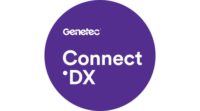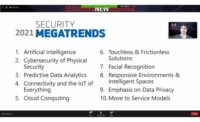After canceling the 2020 conference and delivering a portion of the conference online, ESX — sponsored by the Electronic Security Association (ESA) — made a triumphant return in a fully virtual format, presenting education sessions and panels June 15-17.
The conference kicked off with a keynote from Ryan Estis, a sales and leadership speaker, on how to thrive in today’s connected, competitive business environment, providing attendees with business insights to help with innovation, performance and growth.
According to Estis, embracing digital tools is imperative for security professionals to thrive.
“This is the future and we’re not going back,” he said.
Additionally, Estis said providing a memorable customer experience retains current customers, and gains new customers through word of mouth. He pointed to a moment getting a Starbucks coffee in an airport terminal while traveling and how the barista was able to turn something transactional into a meaningful experience, which left a lasting impression on Estis.
“It’s not what they do, it’s how they do business that differentiates them in the marketplace,” he said.
“OpenXChange — The Changing Competitive Landscape” occurred after the keynote. The panel was moderated by George De Marco, ESX chairman and managing partner for Deco Ventures, and featured Aaron Emigh, CEO and co-founder of Brilliant; Michael Martin, co-founder and CEO of RapidSOS; and Mark Zimmerman, CEO of RSPNDR.
The panel focused on industry trends and disruptors, including smart home and DIY solutions. According to Emigh, these solutions need to be unobtrusive in order to be successful.
“[Smart home technology] disappears when it becomes integrated into the home,” Emigh said.
How to stay relevant and successful in the face of competition was a recurring theme during the conference. The second day kicked off with a keynote from John Mack of Imperial Capital, who discussed this matter in “The Business of Security: Industry Trends, Threats and Opportunities.
Pointing to market research, the security industry has fared well financially in the pandemic compared to other industries, with an increase in RMR when technicians could enter customers’ homes again.
“Security services were not something people were going to turn off during a global pandemic and civil unrest,” Mack said.
Mack pointed out that security professionals have been slow to react to cloud-based and Software as a Service (SaaS) solutions, which is necessary to implement in the current market to stay competitive.
“They’re already migrated to cloud and SaaS in other parts of the business,” he said.
Shifting to an RMR model was also a focus during a Wednesday session, “Powerful Ways to Grow RMR by Exploring New Opportunities,” with Loud Security President John Loud and Preventia Owner Aaron Whitaker, who was featured on our June cover.
“I resisted [increasing rates to increase RMR] for so long, and when I finally listened to the people at these conferences about generating RMR, I realized that is one of the most powerful tools, and you just need to do it,” Whitaker said.
Other tech disruptors were at the forefront of “Monitoring Innovation in Action,” a panel featuring James Marcella, director of industry associations at
Axis Communications; Morgan Hertel, vice president of technology and innovation at Rapid Response Monitoring; and Troy Iverson, vice president at AvantGuard Monitoring Services.
According to Iverson, security professionals should be inspired by other technology giants entering the industry, like Amazon and Google, and focus on cybersecurity to provide excellent service and build relationships with customers.
“Be amazing at what you do. These disruptors — I use that term loosely — they’re not going to stop coming in,” Iverson said.
David Brent, senior cyber and data security technical instructor for Bosch Security Systems, also discussed the current cyber landscape in a session. He touched on recent cyberattacks, the evolution of the typical cyberhacker and why everyone in the physical security industry should care. “You need to know what’s going on in the industry on a daily basis,” he said. “The situation with cybersecurity is an every day moving target.”
The third day featured a shorter schedule with a focus on management and business operations. In “The Great Outdoors – Best Practices for Interactive Video Monitoring,” John Romanowich, president and CEO of SightLogix and Lucas Ingala, owner of Watchmen Security Services, discussed how to choose the right applications to avoid false alarms and false dispatches.
According to Romanowich, great detection and low nuisance alarms are some foundational outdoor alarm requirements. However, meeting these outdoors is difficult since there are more variables to trip off an alarm.
“You don’t know if a neighbor’s cat is going to go by or … a car’s headlights sweeping through the area that you’re securing and causing reflections that could approximate the size of a person,” Romanowoch said.
Additionally, Romanowich pointed to daytime detection, using an example where a person wearing dark clothing was clearly seen on a visible camera, but washed out on a thermal camera. At night in bad weather, people were seen on the thermal camera, but less so on the visible view. Putting these two views together, however, is key.
“By putting the two together, you’re going to get robust 24-hour solution,” he said.
These solutions can be applied in the cannabis space, specifically at cannabis grow sites, which are facing incredible growth. Substations also provide a great application for video monitoring solutions.
Ingala pointed to audio’s emergence in the video monitoring space to deter threats by pointing out the intruder and telling them to vacate the premises.
“Nine times out of 10, it will [work],” Ingala said.
Another Thursday session focused on engaging your customer base, and Chris Peterson, founder and CEO of Vector Firm, discussed the top five ways to keep your customers loyal: focusing on the right accounts; identifying and fixing problems before they’re known; delivering ongoing nurturing and relationship development; asking for favors and elevating your relationship; and conducting vision meetings where you secure your accounts for the long term.
“The sales managers and owners and bosses need to hold their salespeople accountable to these intentional behaviors,” Peterson said. “If they don’t, then we as human beings are going to gravitate towards whatever those little fires are that we have to respond to.”
Premium Pass registrants can view ESX 2021 sessions on-demand through Sept. 17, 2021.
ESX 2022 will take place in-person from June 14-17 in Fort Worth, Texas. For more information, visit the ESX website.




